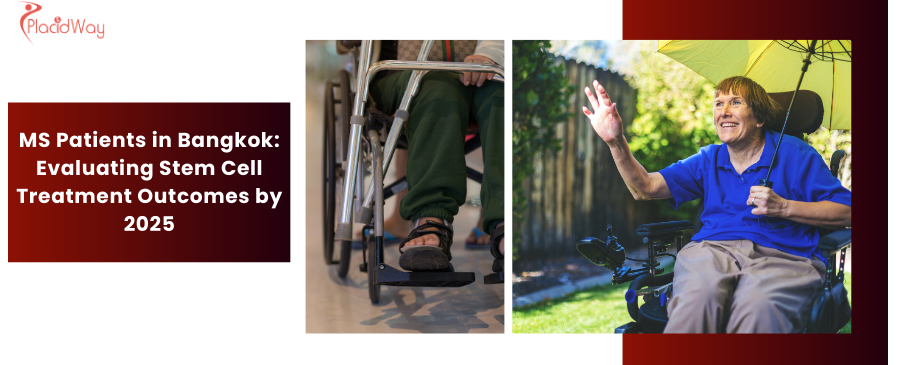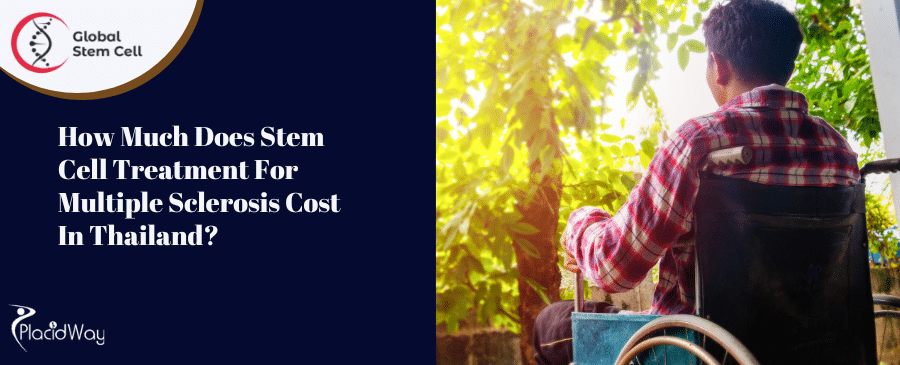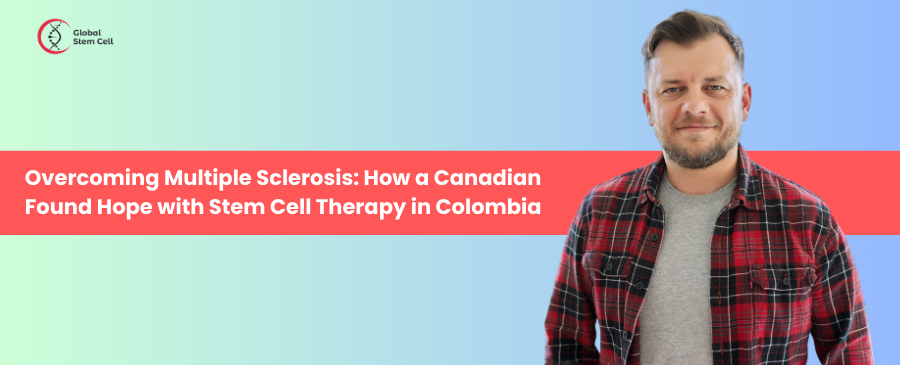Key Takeaways at a Glance
- Promising Progress: Stem cell therapies in Bangkok show potential to slow the progression of MS and alleviate symptoms.
- 2025 Results: Patients report improvements in mobility, reduced fatigue, and enhanced overall well-being.
- Safety First: Leading clinics adhere to strict safety protocols, blending advanced technologies with comprehensive patient care.
- Refined Treatments: Expert doctors and ongoing research are enhancing long-term success rates for MS therapies.
Tabel de conținut
A New Frontier for MS Care
Scleroza multiplă (SM) is a chronic condition that disrupts the central nervous system, often leading to significant physical and emotional challenges. Traditionally, patients depend on immunomodulatory drugs to manage symptoms and slow disease progression. However, by 2025, Bangkok has emerged as a leader in innovative stem cell therapies, offering new hope for MS patients.
These cutting-edge treatments go beyond managing symptoms. By targeting the repair of the protective myelin sheath around nerves, stem cell therapy has the potential to transform daily life for MS patients. In this evolving landscape, Bangkok combines advanced research, ethical practices, and personalized care to redefine what’s possible in MS treatment.
Understanding Stem Cell Therapy for MS
MS arises when the immune system mistakenly attacks the myelin sheath that protects nerves in the brain and spinal cord. This damage disrupts nerve signals, resulting in symptoms like fatigue, weakness, vision problems, and difficulties with balance and coordination.
Stem cell therapy offers a new approach to addressing these challenges. Mesenchymal stem cells (MSCs), often sourced from bone marrow or umbilical cord tissue, are used to support neural repair. These cells work by:
- Reducing Inflammation: MSCs release substances that calm the immune response, potentially preventing further myelin damage.
- Promoting Myelin Repair: Stem cells may stimulate the regeneration of damaged myelin, helping restore nerve function.
- Enhancing Neural Health: They create a supportive environment for nerve cells, which may lead to improved mobility, energy, and overall quality of life.
While not a definitive cure for MS, stem cell therapy is showing increasing effectiveness as clinics refine protocols and identify patient groups most likely to benefit.
2025 Outcomes: What Patients Are Experiencing
Recent evaluations of stem cell therapy in Bangkok reveal encouraging trends for MS patients:
- Încetinirea progresiei bolii
- Many patients report fewer relapses and slower progression of symptoms.
- New lesions appear less frequently, and some existing symptoms stabilize over time.
- Improved Mobility and Balance
- Treatment has helped some patients regain strength, reduce stiffness, and enhance coordination.
- Individuals report walking longer distances, needing less physical support, and performing daily tasks with greater independence.
- Reduced Fatigue and Brain Fog
- Fatigue, a common MS symptom, shows improvement in many cases.
- Patients describe feeling more energetic, experiencing less daytime drowsiness, and enjoying improved focus and mental clarity.
- Enhanced Quality of Life
- Beyond physical improvements, patients find renewed ability to engage in social activities, hobbies, or work.
- These changes foster emotional resilience, bringing hope and a sense of normalcy back to daily life.
It’s important to recognize that results vary from person to person. Factors like the stage of the disease, prior treatments, and individual health play significant roles. Nonetheless, the overall trends underscore the promise of Bangkok’s approach to MS care.
Expert Doctors Leading the Way
When it comes to stem cell therapy, expertise makes all the difference. Bangkok’s top doctors combine advanced research, clinical precision, and compassionate care to ensure the best outcomes for their patients.
Dr. Surasak Jirapornchai
- Ensures clear communication to help patients fully understand therapy goals and treatment timelines.
- Regularly attends international conferences to stay updated with global best practices.
- Involves family members in the treatment planning process, tailoring therapies to meet individual needs.
Dr. Chollawat Thongthaisi
- Customizes stem cell protocols based on each patient’s disease stage and symptom profile.
- Works closely with therapists and nutritionists to develop holistic, multi-disciplinary care plans.
- Fosters open communication, empowering patients to play an active role in their recovery journey.
Dr. Sean Hu
- Focuses on patient comfort, reducing side effects and ensuring seamless follow-up care.
- Continuously monitors outcomes to optimize treatment variables, such as dosage and cell type.
- Strives for consistency and measurable results, helping patients achieve meaningful improvements over time.
These doctors exemplify the human side of cutting-edge science. They guide patients through complex decisions, celebrate every milestone, and provide unwavering support throughout the treatment journey.
Safety and Standards: Building Confidence
Prior to undergoing stem cell therapy, clinics in Bangkok implement rigorous safety measures. These protocols aim to prevent contamination, incorrect dosing, and unethical practices:
Ethical Oversight
Ethical committees and regulatory agencies evaluate treatment strategies, ensuring they prioritize patient welfare and adhere to scientific standards.
Quality Control in Laboratories
Labs that are accredited manage the process of stem cell isolation and preparation. Each sample undergoes a series of tests to verify purity, viability, and safety before any treatment is administered.
Informed Consent
Patients are provided with comprehensive details regarding the potential risks, benefits, and outcomes. No procedures are initiated without their informed consent and comprehension.
Post-Treatment Assessments
Follow-up visits are crucial for identifying any side effects early on. Updates to treatment plans, when necessary, keep patient safety as the top priority.
This stringent framework fosters trust, empowering patients to proceed with confidence, knowing their health is the foremost consideration in every clinical choice.
Financial Aspects and Comparative Quality
Advanced medical treatments often come with hefty price tags. However, stem cell therapies in Bangkok tend to be more cost-effective compared to equivalent services in Western nations. Factors such as lower operating costs and a competitive market allow clinics to provide high-quality care at more affordable rates.
Estimated Costs for MS Stem Cell Therapy in 2025:
- Initial assessments and treatment packages generally start at around $10,000 to $20,000 USD.
- Costs may fluctuate based on the complexity of the therapy, the frequency of sessions, and any supplementary care required.
Value Highlights:
- Highly skilled medical professionals and state-of-the-art equipment
- Clear communication and individualized care plans
- Support services (e.g., airport transfers, language assistance, rehabilitation advice)
- A comprehensive treatment environment that merges biological intervention with lifestyle modifications
The overall value transcends mere cost reductions. It includes enhanced health outcomes, patient contentment, and the reassurance that comes from receiving top-tier medical care.
Travel Advice for International Clients
1. Pre-Travel Arrangements
Communicate with your selected clinic well in advance to verify treatment schedules, necessary documentation, and lodging suggestions.
2. Verify Entry Requirements
Ensure that your passport is valid and familiarize yourself with Thailand’s entry requirements. Some may require a medical visa, so confirm the latest health regulations.
3. Convenient Accommodation
Secure a hotel or serviced apartment close to the clinic. Being nearby alleviates stress leading up to and following treatments. Many options also provide wheelchair accessibility and other assistance for guests with mobility challenges.
4. Language and Support Services
Bangkok’s medical tourism sector often features English-speaking staff. Nonetheless, a translation app or learning a few basic Thai phrases can be helpful for day-to-day interactions.
5. Allow for Recovery Time
Do not rush. Designate time for recuperation after therapy sessions. Opt for light, enjoyable activities instead of an overloaded sightseeing schedule.
6. Set Realistic Expectations
Depending on your treatment, it may take several days or weeks. Ensuring a comfortable and safe environment for recovery and adjusting to any health changes is essential.
Patient Experiences: Stories of Hope and Progress
Individuals battling MS frequently share uplifting testimonials after their stem cell therapy in Bangkok. For example:
- An ex-office manager from the UK faced severe fatigue and leg weakness. After treatment, she managed to walk a few short distances unaided and returned to part-time work.
- A father of two from Canada reported experiencing fewer relapses and more stable energy levels, allowing him to enjoy family outings without constant concern.
- A young individual diagnosed with early-stage MS noted improvements in coordination and steadiness, granting her the ability to return to beloved outdoor activities.
While these accounts are diverse in scale, each showcases renewed hope and concrete benefits, illustrating that stem cell therapy can significantly enhance lives.
Future Outlook: Advancing Therapies and Results
Bangkok’s medical community sees 2025 not as a conclusion but as a beginning. Ongoing research seeks to:
Determine Optimal Cell Types
Investigators are analyzing MSCs and various cell types to identify the most effective options for treating different MS manifestations.
Personalize Dosages and Delivery
Modifying the quantity of cells, delivery techniques (intravenous or intrathecal), and timing could yield better results.
Monitor Long-Term Data
Comprehensive follow-ups over several years, rather than just months, will provide insights into which benefits are sustained and how therapies adapt with disease progression.
Integrate Therapies
Combining stem cell therapy with new medications, dietary strategies, or innovative rehabilitation methods may lead to even improved outcomes.
As knowledge expands, clinics in Bangkok are ready to spearhead global discussions on best practices for treating MS, promising continuous improvement and adaptation, ensuring that future patients benefit from accumulated knowledge and advancing skills.
Întrebări frecvente
1. When can MS patients expect to see improvements after stem cell therapy?
Timeframes differ. Some individuals may notice subtle improvements within a few weeks, while others might take months. Variables like the severity of MS, the type of stem cells used, and adherence to rehabilitation influence the speed of progress.
2. Are results from stem cell therapy permanent?
While stem cell therapy does not ensure permanent remission, it may slow disease progression, reduce flare-ups, and enhance quality of life for an extended time. Ongoing follow-ups and supportive care are essential for maintaining these benefits.
3. Can I continue my MS medications following stem cell therapy?
In many cases, yes. Healthcare providers often recommend continuing existing medication while incorporating stem cell therapy. They will advise on any necessary adjustments to ensure therapies work together effectively.
4. Is it safe to travel for MS treatment?
With appropriate organization and support from the clinic, traveling for MS treatment is generally safe. Healthcare providers in Bangkok routinely assist international patients with logistics, linguistic barriers, and cultural orientation.
5. Is stem cell therapy suitable for all MS patients?
Not all patients are ideal candidates. Those with severely advanced conditions or specific health issues might not experience substantial benefits. Medical professionals evaluate each patient’s situation and history to determine suitability and establish realistic expectations.
Bangkok’s Contribution to MS Treatment Innovations
In 2025, Bangkok is at the cutting edge of stem cell therapies for MS, presenting patients with new opportunities to manage symptoms and enhance their quality of life. With strict safety standards, highly trained professionals, and advanced medical facilities, treatments are safe, effective, and within reach. Patients now have alternatives to traditional medication, exploring regenerative therapies aimed at slowing disease progression, restoring lost functions, and reigniting hope.
As research continues to evolve, Bangkok’s medical community is dedicated to refining treatments, broadening insights, and fostering international collaborations. This city’s methodology embodies a future focused on healing rather than merely coping, encouraging patients worldwide to embrace transformative, scientifically-backed solutions in the vibrant heart of Thailand’s capital.







